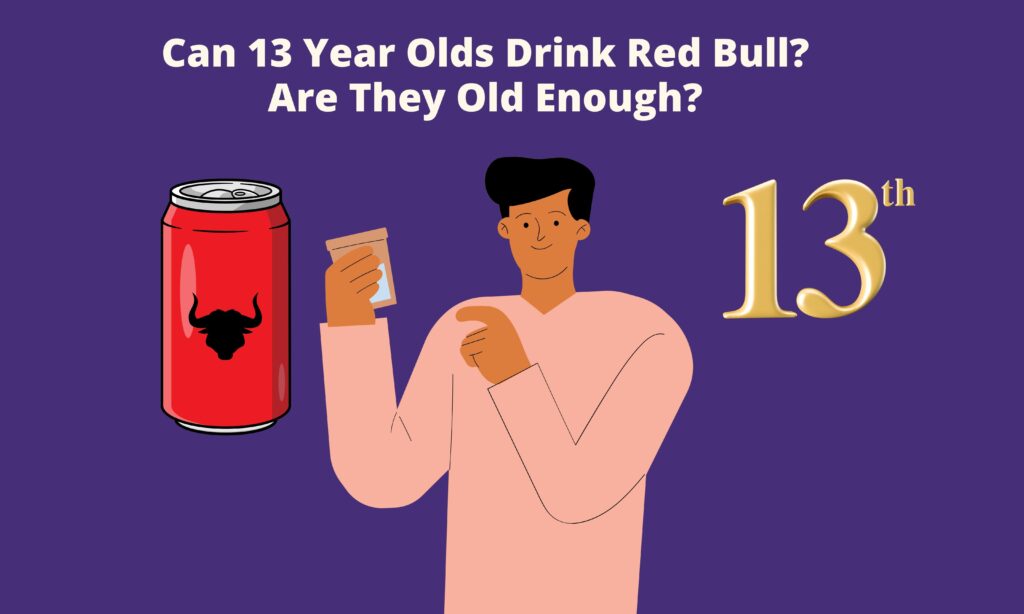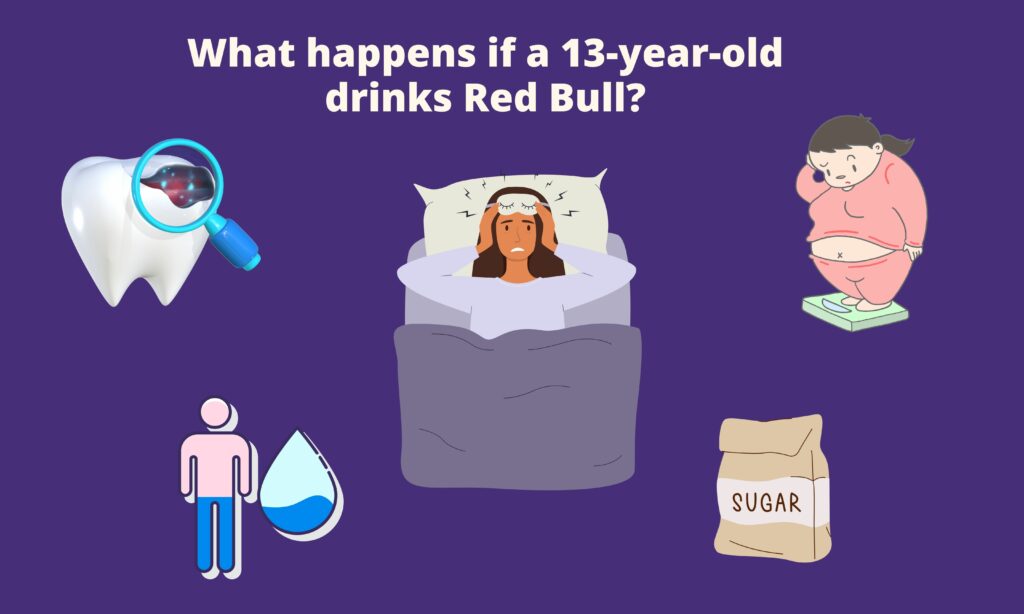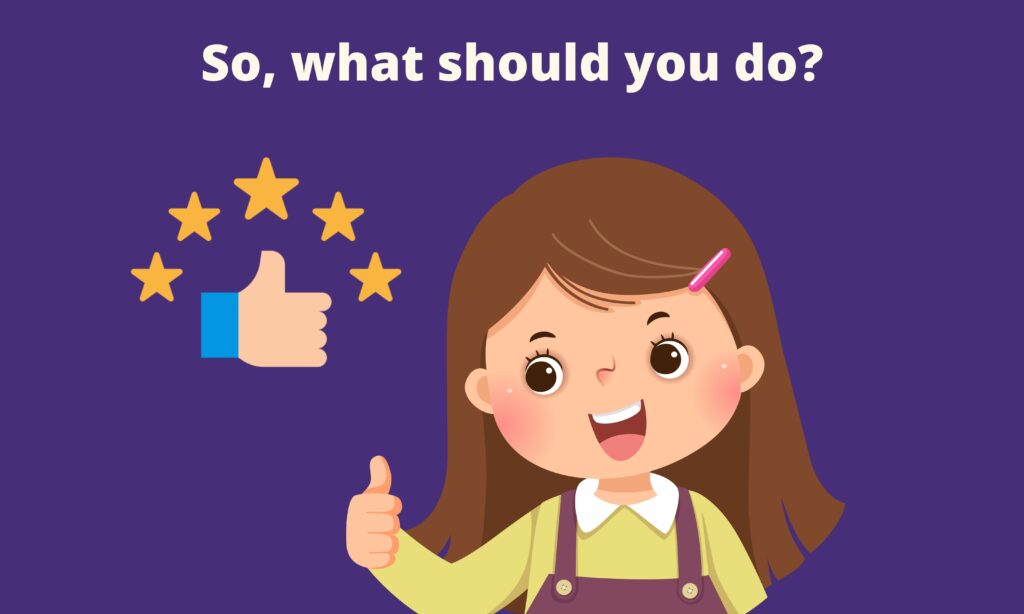
Red Bull is a popular energy drink that has gained widespread popularity among teenagers and young adults. However, many parents are concerned about their children’s consumption of Red Bull, especially when it comes to 13-year-olds. So, can 13-year-olds drink Red Bull? Are they old enough to handle its effects? In this article, we will explore this topic in detail and provide you with all the necessary information.
The effects of Red Bull on a 13-year-old’s body
Red Bull contains a high amount of caffeine and sugar, which can have significant effects on a 13-year-old’s body. The caffeine content can cause increased heart rate, elevated blood pressure, and nervousness. Moreover, the sugar content can lead to weight gain, tooth decay, and other health problems. While these effects may not be significant in moderation, excessive consumption can be dangerous.
What do experts say about Red Bull and 13-year-olds?
According to the American Academy of Pediatrics, children and adolescents should not consume energy drinks like Red Bull. This is because the high caffeine content can have adverse effects on their health, especially those with underlying medical conditions. Moreover, the sugar content can contribute to obesity and other health problems.
Alternatives to Red Bull for 13-year-olds
If your child is looking for an energy boost, there are several healthier alternatives to Red Bull. One such option is drinking water, which can help to hydrate the body and improve cognitive function. Another alternative is drinking natural fruit juices, which can provide essential vitamins and minerals that can improve energy levels. Additionally, healthy snacks like nuts, fruits, and vegetables can provide a natural source of energy.
In conclusion, can 13-year-olds drink Red Bull? The answer is no. Red Bull is not suitable for children and adolescents, as its high caffeine and sugar content can have adverse effects on their health. Parents should encourage their children to adopt healthier alternatives, such as drinking water, natural fruit juices, and eating healthy snacks. As always, it is essential to consult a healthcare professional before introducing any new dietary changes to your child.
Are energy drinks safe for teens?
Energy drinks have become a popular choice among teens, especially during long hours of studying or during sports activities. While these drinks can provide a quick energy boost, there are concerns about their safety, particularly for teens. So, can 13-year-olds drink Red Bull or other energy drinks? In this article, we will explore this topic in detail and provide you with all the necessary information.
The Risks of Energy Drinks for Teens
Energy drinks, including Red Bull, can have several risks for teenagers. One of the main concerns is the high caffeine content. A typical 8-ounce energy drink can contain up to 80 milligrams of caffeine, which is equivalent to a cup of coffee. Consuming too much caffeine can lead to increased heart rate, high blood pressure, insomnia, anxiety, and other health issues.
Moreover, energy drinks often contain high levels of sugar, artificial sweeteners, and other chemicals that can cause weight gain, tooth decay, and other health problems. The combination of caffeine and sugar can also lead to dehydration, which can be dangerous, especially during sports activities.
What Do Experts Say About Energy Drinks for Teens?
Many health experts and organizations, including the American Academy of Pediatrics, advise against energy drinks for teenagers. The American Academy of Pediatrics recommends that adolescents aged 12 to 18 years should not consume more than 100 milligrams of caffeine per day. This is equivalent to one cup of coffee or a can of soda.
Alternatives to Energy Drinks for Teens
There are several healthier alternatives to energy drinks that can provide the same energy boost. Drinking water is an excellent way to stay hydrated and improve cognitive function. Eating a balanced diet that includes whole grains, fruits, vegetables, and lean proteins can also provide essential vitamins and minerals that can boost energy levels.
In conclusion, can 13-year-olds drink Red Bull or other energy drinks? It is not recommended. Energy drinks can have adverse effects on teens’ health, particularly due to their high caffeine and sugar content. Parents should encourage their children to adopt healthier alternatives, such as drinking water, eating a balanced diet, and getting enough sleep. As always, it is essential to consult a healthcare professional before introducing any new dietary changes to your child.
What happens if a 13-year-old drinks Red Bull?

Red Bull is a popular energy drink that is commonly consumed by teenagers and young adults. However, many parents are concerned about their children’s consumption of Red Bull, especially when it comes to 13-year-olds. So, what happens if a 13-year-old drinks Red Bull? In this article, we will explore this topic in detail and provide you with all the necessary information.
The Effects of Red Bull on a 13-Year-Old’s Body
Red Bull contains a high amount of caffeine and sugar, which can have significant effects on a 13-year-old’s body. The caffeine content can cause increased heart rate, elevated blood pressure, and nervousness. Moreover, the sugar content can lead to weight gain, tooth decay, and other health problems. These effects may not be significant in moderation, but excessive consumption can be dangerous.
Impact on Mental Health
In addition to physical health effects, Red Bull can also impact mental health. Caffeine can cause anxiety and jitteriness, which can lead to difficulty sleeping and irritability. Excessive consumption can also lead to caffeine dependence and withdrawal symptoms, such as headaches and fatigue.
Impact on Academic Performance
Red Bull can also have an impact on academic performance. While it may provide a temporary energy boost, the caffeine and sugar content can lead to crashes and decreased focus and attention span. This can ultimately lead to poor academic performance, particularly if consumed regularly.
What to Do if a 13-Year-Old Drinks Red Bull
If a 13-year-old consumes Red Bull, it is essential to monitor them for any adverse effects, such as increased heart rate or nervousness. Encourage them to drink plenty of water to stay hydrated and counteract the dehydrating effects of caffeine. If symptoms persist or worsen, seek medical attention immediately.
In conclusion, can 13-year-olds drink Red Bull? While it may not be illegal or against company policy for them to do so, it is not recommended due to the high caffeine and sugar content. Red Bull can have significant effects on a 13-year-old’s physical and mental health and academic performance. As always, it is essential to encourage healthy alternatives and monitor children’s consumption of caffeine and other stimulants.
So, what should you do?

With conflicting information and concerns surrounding the consumption of energy drinks by teenagers, it can be challenging to know what to do. Can 13-year-olds drink Red Bull? While it may not be illegal or against company policy for them to do so, it is essential to consider the risks and make informed decisions. In this article, we will provide you with some tips on what you can do.
Educate Yourself and Your Child
One of the best things you can do is educate yourself and your child about the risks and benefits of energy drinks. Understanding the potential health effects can help you make informed decisions and encourage healthy habits. You can also explain why it is important to limit caffeine and sugar intake and encourage alternatives, such as water or sports drinks.
Encourage Open Communication
It is essential to encourage open communication with your child and establish clear rules and expectations regarding energy drinks. Let your child know your concerns and explain the reasons behind your decisions. Encourage them to ask questions and share their thoughts and feelings. This can help you build trust and strengthen your relationship.
Set Limits and Boundaries
Setting limits and boundaries is essential to ensure your child’s safety and well-being. Establish clear guidelines on when and how much energy drinks your child can consume, if any. Consider setting a daily caffeine limit and encouraging healthier alternatives, such as water or natural fruit juices. You can also consider setting a curfew for consumption to avoid interfering with sleep patterns.
Lead by Example
Leading by example is an effective way to encourage healthy habits and discourage unhealthy ones. Avoid consuming energy drinks yourself and encourage healthy alternatives. Make sure your child sees you drinking water and other healthy beverages and encourage a balanced diet.
In conclusion, while the question of whether 13-year-olds can drink Red Bull may not have a straightforward answer, taking an informed and proactive approach can help protect your child’s health and well-being. Educate yourself and your child, encourage open communication, set limits and boundaries, and lead by example. Remember, it is never too early to encourage healthy habits and promote a healthy lifestyle.
FAQs
There are many questions and concerns surrounding the consumption of energy drinks by teenagers, particularly when it comes to Red Bull. Can 13-year-olds drink Red Bull? In this article, we will answer some frequently asked questions to provide you with more information and help you make informed decisions.
Q: Is it safe for 13-year-olds to drink Red Bull?
A: While it may not be illegal or against company policy for 13-year-olds to drink Red Bull, it is not recommended due to the high caffeine and sugar content. These can have significant effects on a 13-year-old’s physical and mental health and academic performance.
Q: How much caffeine is in Red Bull?
A: One can of Red Bull (8.4 oz) contains approximately 80mg of caffeine. However, larger sizes are also available, which can contain up to 240mg of caffeine per can.
Q: What are the potential health risks of consuming Red Bull?
A: Consuming excessive amounts of Red Bull can lead to increased heart rate, elevated blood pressure, nervousness, anxiety, and caffeine dependence. It can also lead to weight gain, tooth decay, and poor academic performance.
Q: What are some healthy alternatives to Red Bull?
A: Encouraging your child to drink water or sports drinks can be a healthy alternative to Red Bull. Natural fruit juices, coconut water, and herbal teas can also provide energy and hydration.
Q: What should I do if my child consumes Red Bull?
A: If your child consumes Red Bull, it is important to monitor them for any adverse effects, such as increased heart rate or nervousness. Encourage them to drink plenty of water to stay hydrated and counteract the dehydrating effects of caffeine. If symptoms persist or worsen, seek medical attention immediately.
In conclusion, the consumption of energy drinks by teenagers, particularly Red Bull, can have significant effects on their health and well-being. While it may not be illegal or against company policy for 13-year-olds to drink Red Bull, it is not recommended. Encourage healthy alternatives and monitor your child’s consumption of caffeine and other stimulants. If you have any concerns or questions, it is always best to consult with a medical professional.
Final thoughts
In conclusion, the question of whether 13-year-olds can drink Red Bull is a complex one that requires careful consideration of many factors. While it may not be illegal or against company policy for teenagers to consume energy drinks, it is important to consider the potential risks and make informed decisions. Here are some final thoughts to keep in mind.
Consider the Risks
The risks of consuming energy drinks, including Red Bull, cannot be overstated. Caffeine and sugar can have significant effects on a teenager’s physical and mental health, leading to increased heart rate, elevated blood pressure, nervousness, anxiety, caffeine dependence, weight gain, tooth decay, and poor academic performance. It is essential to consider these risks and take proactive measures to protect your child’s health and well-being.
Encourage Healthy Habits
Encouraging healthy habits is a crucial part of promoting a healthy lifestyle and preventing the harmful effects of energy drinks. Encourage your child to drink plenty of water and natural fruit juices, eat a balanced diet, get enough sleep, and exercise regularly. Modeling these behaviors yourself can also help your child adopt healthy habits.
Seek Professional Advice
If you have concerns about your child’s consumption of energy drinks or caffeine, it is always best to seek professional advice. A medical professional can provide you with more information and guidance on how to make informed decisions regarding your child’s health and well-being.
Monitor Consumption
Monitoring your child’s consumption of energy drinks, including Red Bull, is crucial to ensure their safety and well-being. Consider setting clear guidelines on when and how much energy drinks your child can consume, if any. Monitor their behavior and symptoms for any adverse effects, and encourage them to drink plenty of water to counteract the dehydrating effects of caffeine.
Conclusion
In conclusion, the question of whether 13-year-olds can drink Red Bull is not a straightforward one. It requires careful consideration of the potential risks and benefits, and proactive measures to promote a healthy lifestyle. Encourage healthy habits, seek professional advice, and monitor your child’s consumption of energy drinks to ensure their safety and well-being. Remember, it is never too early to start promoting a healthy lifestyle and setting your child up for a lifetime of good health.